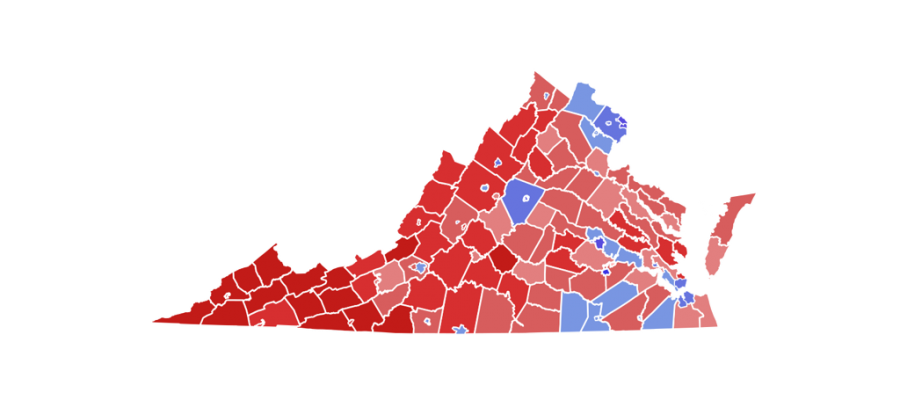Community Reacts to Virginia Election Results
Youngkin was able to win by running up the margins in dozens of rural counties (45 of them he won with 70% of the vote or more, 15 of them with over 80%) and by narrowing his losses in densely populated urban and suburban counties.
November 26, 2021
The 2021 elections this month delivered an array of victories up for Republicans up and down the ballot. The most notable of these victories was in Virginia’s gubernatorial election, where they also took back the House of Delegates, lieutenant governorship, and attorney general seat. Glenn Youngkin, the Republican candidate and now governor-elect, ran on local issues such as letting parents have more of a say over their children’s education and getting rid of local taxes. Terry McAuliffe’s campaign spent a significant amount of time trying to tie Youngkin with former president Donald Trump, who lost Virginia by a ten point margin in last year’s presidential election.
Republicans regained much of the suburban vote they lost in the 2018 midterms, when dozens of GOP areas went blue for the first time in decades.
Out of 79 faculty and student responses who filled out a poll sent out, 33 knew about the election, and 28 of those people wanted McAuliffe to win. Of the 3 people who wanted Youngkin to win, none were willing to be interviewed.
“Youngkin did a great job turning out the GOP base and it really showed,” said sophomore Oliver Kreeger. “He sort of did this diet-MAGA thing where he effectively turned out Trump’s base with the right rhetoric, but he didn’t nationalize the race in a way that would make it the full Make America Great Again — which wouldn’t play well in Virginia — and it worked.”
“I’m disappointed with McAuliffe’s poor showing, but not very surprised. I think Youngkin in appealing to parental frustration in what they see in changes in students’ curriculum has been powerful, especially with what’s happening with school closures and mask mandates. I think parents are generally feeling protective or defensive, so further senses of things changing in schools can fire parents up” said upper school English teacher Dr. West.
Following Gov. Gavin Newsom’s victory by nationalizing the 2021 California gubernatorial recall election, Democrats across the country tried nationalizing their races too, though it seems to be an unreliable strategy in retrospect.
“I think that, at times, nationalizing a state or local race can be dangerous. Often, voters don’t care about officials from the west coast flying in or being pummeled with ads that make the race out to be something that is important to the whole country. While it definitely is, I think the ‘this is federal’ rhetoric could be fatal to the Democrats,” said junior Tyler Hack. “I think that we—myself included—learned a very clear lesson: voters need something to vote for, not just something to vote against. ‘Don’t Texas My Virginia’—a key slogan of the McAuliffe campaign—didn’t give Virginians any insight into what his administration would do.”
Despite the Democratic setbacks, there is still a desire to see Biden’s agenda passed through Congress.
“[Democrats should] get their act together and pass legislation instead of bickering,” said Dr. West.
“I think now is the time to pass Build Back Better,” said Kreeger.
However, West and Kreeger also expressed concern with how the progressive movement is portrayed or portrays itself in public.
Kreeger said, “I think the eternal dilemma for the progressive movement is that we are backed up by activists — and we wouldn’t be the same without them, organizing-wise or support-wise — but the other part is that sometimes we allow ourselves to devolve into this caricature of the ‘radical left’ or the ‘woke left.’ It damages us in these municipal races like in Seattle or maybe Minneapolis too,” (referring to the Seattle City Attorney race and a Minneapolis ballot measure to overhaul policing). He continued, “Sometimes progressives have struggled because we’ve allowed ourselves to be dominated by white college activists, but I think we need them and their support. For local races we just have to talk about how progressivism is going to help people, and we can do a good deed by steering away from identity politics, which I think doesn’t really help us a lot. It’s important that we focus more on the material victories that a progressive agenda could bring in terms of better wages, free healthcare, jobs, and climate action, and meaningful police reform. But we have to distinguish ourselves in a way that it’s not just identity politics.”
Dr. West said that November’s results made him “feel that progressives are overplaying certain issues in ways that alienate centrist voters. But trying to figure out the balance between equity and progress with what’s sustainable or what is liable to be taken out of context or mischaracterized, or is genuinely excessive, that’s a tricky road to pick out but hopefully people thinking about upcoming elections can think about ways to move forward that are sustainable or supportable.”
“We have to be accommodating and run on more material concerns rather than this very esoteric identity stuff,” said Kreeger.




